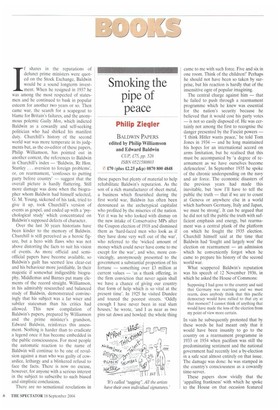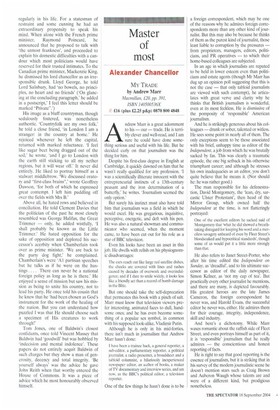Smoking the pipe of peace
Philip Ziegler
BALDWIN PAPERS edited by Philip Williamson and Edward Baldwin CUP, £75, pp. 526 ISBN 0521580803 © £70 (plus £2.25 p&p) 0870 800 4848 If shares in the reputations of defunct prime ministers were quoted on the Stock Exchange, Baldwin would be a sound longterm investment. When he resigned in 1937 he was among the most respected of statesmen and he continued to bask in popular esteem for another two years or so. Then came war, the search for a scapegoat to blame for Britain's failures, and the anonymous polemic Guilty Men, which indicted Baldwin as a cowardly and self-seeking politician who had shirked his manifest duty. Churchill's history of the second world war was more temperate in its judgments but, as the co-editor of these papers, Philip Williamson, has pointed out in another context, the references to Baldwin in Churchill's index — 'Baldwin, Rt Hon. Stanley ... aversion to foreign problems', or, on rearmament, 'confesses to putting party before country' — suggest that the overall picture is hardly flattering. Still more damage was done when the biographer whom Baldwin had himself selected, G. M. Young, sickened of his task, tried to give it up, took Churchill's version of events as gospel, and ended up with a 'psychological study' which concentrated on Baldwin's supposed defects of character.
Over the last 30 years historians have been kinder to the memory of Baldwin. Churchill is still perceived as a heroic figure, but a hero with flaws who was not above distorting the facts to suit his vision of events. As more official and semiofficial papers have become available, so Baldwin's guilt has seemed less clear-cut and his behaviour more justifiable. In their majestic if somewhat indigestible biography, Middlemas and Barnes put many elements of the record straight. Williamson, in his admirably researched and balanced study of Baldwin, demonstrated convincingly that his subject was a far wiser and subtler statesman than his critics had allowed, This new compilation of Baldwin's papers, prepared by Williamson and the prime minister's grandson, Edward Baldwin, reinforces this assessment. Nothing is harder than to eradicate a legend once it has become embedded in the public consciousness. For most people the automatic reaction to the name of Baldwin will continue to be one of revulsion against a man who was guilty of cowardice, lethargy and a blinkered refusal to face the facts. There is now no excuse, however, for anyone with a serious interest in the subject to subscribe to such biased and simplistic conclusions.
There are no sensational revelations in these papers but plenty of material to help rehabilitate Baldwin's reputation. As the son of a rich manufacturer of sheet metal, a business which flourished during the first world war, Baldwin has often been denounced as the archetypical capitalist who profited by the miseries of the nation. Yet it was he who looked with dismay on the new intake of Conservative MPs after the Coupon election of 1918 and dismissed them as 'hard-faced men who look as if they have done very well out of the war', who referred to the 'wicked amount of money which could never have come to me except for the war', and who, more convincingly, anonymously presented to the government a substantial proportion of his fortune — something over £.3 million at current values — 'as a thank offering, in the firm conviction that never again shall we have a chance of giving our country that form of help which is so vital at the present time'. In 1925 he visited Dundee and toured the poorest streets. 'Oddly enough I have never been in real slum houses,' he wrote, 'and I as near as two pins sat down and howled: the whole thing came to me with such force. Five and six in one room. Think of the children!' Perhaps he should not have been so taken by surprise, but his reaction is hardly that of the insensitive ogre of popular imagining.
The central charge against him — that he failed to push through a rearmament programme which he knew was essential for the nation's security because he believed that it would cost his party votes — is not so easily disposed of. He was certainly not among the first to recognise the danger presented by the Fascist powers — 'I think Hitler wants peace,' he told Tom Jones in 1934 — and he long maintained his hopes for an international accord on arms limitation, but he realised that this must be accompanied by 'a degree of rearmament as we have ourselves become defenceless'. In September 1935 he spoke of the chronic underspending on the navy and air force. The economic disasters of the previous years had made this inevitable, but `now I'll have to tell the public the truth — that if we are to count at Geneva or anywhere else in a world which harbours Germany, Italy and Japan, we must be strong'. It can be argued that he did not tell the public the truth with sufficient emphasis and energy, but rearmament was a central plank of the platform on which he fought the 1935 election. Churchill himself said at the time that Baldwin had 'fought and largely won' the election on rearmament — an admission which he conveniently forgot when he came to prepare his history of the second world war.
What scuppered Baldwin's reputation was his speech of 12 November 1936, in which he asked the House of Commons:
Supposing I had gone to the country and said that Germany was rearming and we must rearm, does anybody think that this pacific democracy would have rallied to that cry at that moment? I cannot think of anything that would have made the loss of the election from my point of view more certain.
In vain he subsequently protested that by these words he had meant only that it would have been insanity to go to the country on a rearmament programme in 1933 or 1934 when pacifism was still the predominating sentiment and the national government had recently lost a by-election in a safe seat almost entirely on that issue. The damage was done: he was stamped in the country's consciousness as a cowardly time-server.
These papers show vividly that the 'appalling frankness' with which he spoke to the House on that occasion featured regularly in his life. For a statesman of restraint and some cunning he had an extraordinary propensity to speak his mind. When alone with the French prime minister, Raymond Poincare, he announced that he proposed to talk with 'the utmost frankness', and proceeded to explain his domestic difficulties with a candour which most politicians would have reserved for their trusted intimates. To the Canadian prime minister, Mackenzie King, he dismissed his lord chancellor as an irresponsible drunk. Lloyd George, he told Lord Salisbury, had `no bowels, no principles, no heart and no friends' (On glancing at the concluding paragraph,' he added in a postscript,' I feel this letter should be marked "Private".') His image as a bluff countryman, though sedulously fostered, was nonetheless authentic. `Countryfolk are my own folk.' he told a close friend, 'in London I am a stranger: in the country at home.' He rejoiced whenever he left the capital, returned with marked reluctance. '1 feel like sugar beet being dragged out of the soil,' he wrote, 'and I go to London with the earth still sticking to all my nether regions, but it will wear off,' It never did entirely. He liked to portray himself as a stalwart middlebrow. 'We discussed oratory and ''first-class brains"; wrote Geoffrey Dawson, 'for both of which he expressed great contempt. I left him puddling off over the fields with Mrs 11' Above all, he hated rows and believed in conciliation. He told Clement Davies that the politician of the past he most closely resembled was George Halifax, the Great Trimmer — only, he added wistfully, 'I shall probably be known as the Little Trimmer.' He hated opposition for the sake of opposition and deplored his successor's acerbity when Chamberlain took over as prime minister. 'We are back to the party dog fight,' he complained. Chamberlain's were 'Al partisan speeches but he talks as if he were on the hustings... . There can never be a national foreign policy as long as he is there.' He enjoyed a sense of mission but saw his mission as being to unite his country, not to lead his party. He once told his cousin that he knew that he 'had been chosen as God's instrument for the work of the healing of the nation. But you can understand how puzzled I was that He should choose such a specimen of His creatures to work through?'
Tom Jones, one of Baldwin's closest confidants, once told Vincent Massey that Baldwin had 'goodwill' but was hobbled by 'indecision and mental indolence'. These papers do not entirely acquit Baldwin of such charges but they show a man of generosity, decency and total integrity. 'Be yourself always' was the advice he gave John Reith when that worthy entered the House of Commons. It was a piece of advice which he most honourably observed himself.



















































































 Previous page
Previous page